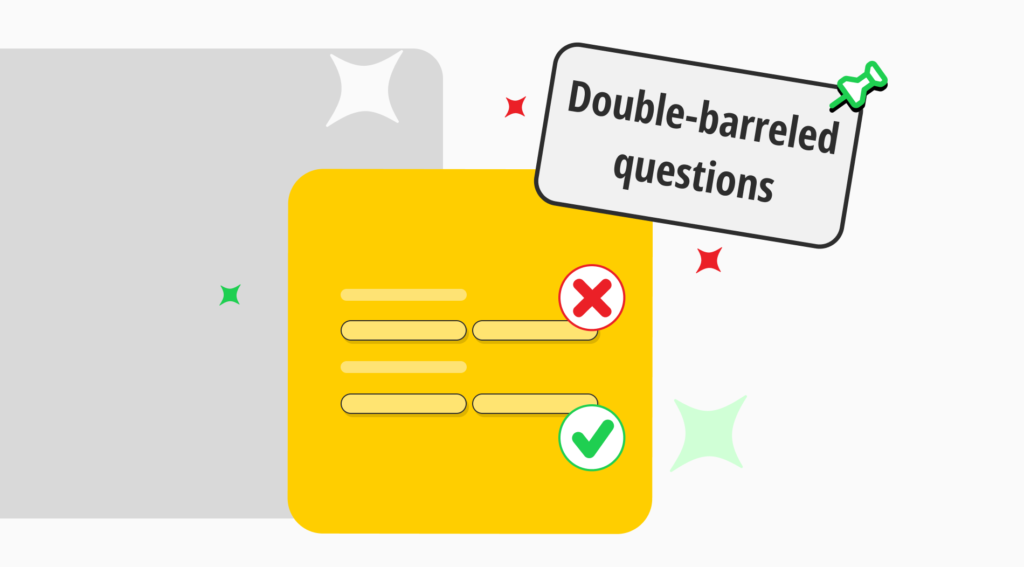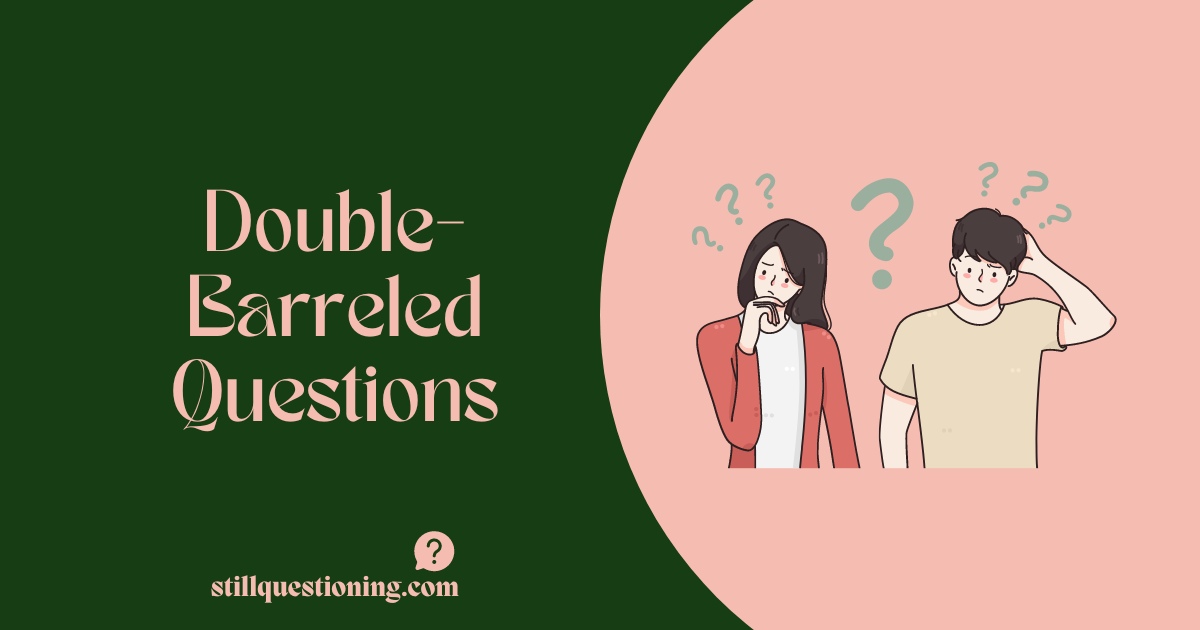Are you stuck in the mistake of asking two questions in one or double-barreled questions? If so, this can confuse your respondents when answering. As a result, the final survey results might not be worth using.
In this guide, we will launch common examples of a double-barreled question, as well as how to eliminate this fault in the research. Right now, let’s discover with us below!
Table of Contents
What Is A Double-Barreled Question?
A double-barreled question is considered a survey trap that sneaks in 2 topics and expects one answer. This can confuse your respondents and spoil your data unexpectedly. That’s why you should find a way to avoid this common pitfall and learn how to make questions clearer to attain the best performance.
Fortunately, it is not difficult to detect a double barrel survey question. From our experience, if you see more than one thing asked in the same sentence, there might be a double-barrel question. Normally, check for the word “and” as an outstanding mark.

Outstanding Examples of Double-Barreled Questions
After displaying a double-barreled question definition, we will show several basic examples to help you have a deeper understanding of this kind of question, including:
#1. Employee survey
The first double-barreled question example relates to how you ask for your employee at work. We believe that it is one of the most common topics in research. In particular:
- How would you evaluate your current onboarding and training process?
- Are you happy with your work, or do you find your work satisfactory?
- Do you think AI makes you enhance performance and gain efficiency?
- Which do you like most about your company and department?
#2. Customer Survey
In conducting customer surveys, there is also a double-barreled question list that you easily make your respondents difficult to understand, such as:
- Do you find our product easy to use and useful in your life?
- How often do you visit our store and buy our products?
- How satisfied were you with your recent in-store experience and purchase?
- How likely are you to recommend and return to this store?
From that, you can easily detect that the double-barreled question survey normally covers a lot of “and” or even “or”. And, of course, your respondents can not know which question part they should prefer.

How To Avoid Double-Barreled Questions In Research
If you want to restrict double-barreled questions in research effectively, don’t miss our useful tips below. Including:
#1. Check your questions carefully
First and foremost, you need to read and check all questions carefully. For many people, it’s an obvious thing. However, some don’t care about this step and believe that they have no mistakes in how they set up questions. As a result, a range of double-barred questions were found in the final performance.
A good survey question should ask one thing. If you find yourself cramming two or more ideas into one question, let’s split it up immediately. Or else you will get meaningless answers.
#2. Always run a survey trial
Don’t launch your survey when you don’t have any test version for it. In this case, we recommend you send your survey questions to a small group first to get a small number of answers. Then, let’s check these results to detect whether your respondents tend to release repeated answers. If so, it’s time you rewrite questions until they are simple, clear, and direct to understand.

#3. Navigate your questions to match your goals
The final solution to restrict double-barreled questions in research is making it focus on your survey goal. Normally, many people make the mistake of asking too many or irrelevant questions to their targeted audiences. As a result, your survey performance might be bad!
Below are some of our suggestions to attain this solution, including:
- Always identify your target audience and groups before running a survey
- Select a proper type of questions to promote your idea effectively
- Restrict using “and” and “or” to navigate to your targeted answers
You May Also Like:
- Questioning Techniques
- 5+ Key Benefits of Learning by Questions
- Open and Closed Questions
- Questions for Higher-Order Thinking
- What Is a Double-Barreled Question?
- Example Of A Rhetorical Question
- What Are Probing Questions?
FAQs – Double Barreled Question
What is a double-barreled question example?
One typical double-barreled question example to consider is “How much do you enjoy analyzing and processing data.” In this case, you can see that “analyze” and “process” nearly have the same meaning to discuss. Thus, your respondents tend to provide similar answers.
What is an example of a double-ended question?
To illustrate an example of a double-ended question, we suggest both questions: “Are you happy or depressed?” and “Do you want coffee or milk tea?”. For the final answer, you need to get one of the two options without explaining so much.
What is a leading vs double-barreled question?
While a leading question requires respondents to give a particular answer, a double-barreled question will ask you two questions as a single one. And, of course, this will make providing good information for your survey difficult.
Which is an example of a double-barreled question quizlet?
For an example of a double-barreled question quizlet, you can refer to this question: “ Do you disagree or agree with the case that students should focus on extracurricular activities instead of academic knowledge?”. Well, this example might be so long and challenging to catch.
Conclusion
Our blog has just helped you learn how to differentiate a double-barred question from other kinds of questions. Besides that, don’t refer to our useful tips to avoid double-barreled questions effectively. For more useful research tips, visit our Live World Cloud Generator community for interesting experiences.
Every great conversation starts with a question. So, still questioning and staying curious!





